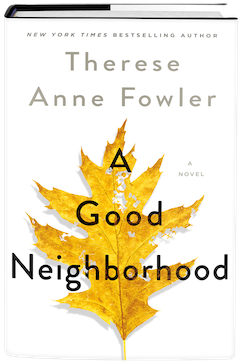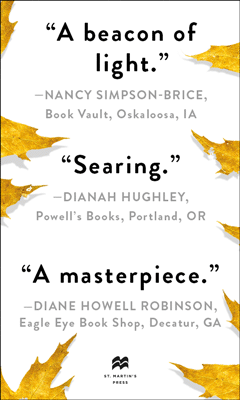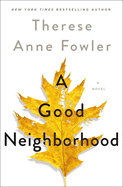A Good Neighborhood
by Therese Anne Fowler
In Therese Anne Fowler's followup to Z and A Well-Behaved Woman she turns from historical fiction to a contemporary novel touching on some of the most divisive issues in American life. A Good Neighborhood is a tragedy, and Fowler never lets the audience doubt that it will all end in tears. In the very first paragraph, Fowler writes: "Later this summer when the funeral takes place, the media will speculate boldly on who's to blame." The heavy foreshadowing alludes to Shakespearean tragedy, as does the story of young, forbidden love gone awry. The novel even has a Greek chorus of a sort--it's narrated by the collective voice of the neighborhood.
A Good Neighborhood's "two households, both alike in dignity" are that of the Whitmans and the Alston-Holts. Set in a North Carolina neighborhood with a progressive reputation, the seeds of conflict are sown when the Whitmans build a lavish house--complete with a backyard pool--next to the Alston-Holts' more modest home. Single mother Valerie Alston-Holt, a professor of forestry and ecology, has deep reservations about the construction, especially the effect it might have on a beloved old tree on her property. Brad Whitman, the patriarch of the Whitman clan, makes a poor impression when he mistakes Xavier, her mixed-race, conservatory-bound son, for a yard worker. When Xavier tells his mother about Brad's mistake, she answers: "Are we surprised?"
Still, young love has a way of breaking through barriers of race, class or anything else. Xavier's attraction to Brad's stepdaughter, Juniper, is immediate, and he soon discovers that she's far from a pampered rich girl. Juniper's life changed dramatically when her mother, Julia, married Brad, vaulting them from trailer-park poverty to wealth. Even years later, Julia and Juniper don't take their change in status for granted. Fowler uses the small scale of the story--set primarily in the neighboring households--to focus on the characters and their relationships. And through the gossipy voices of the neighborhood she carefully teases out the fault lines that will eventually put the neighbors at odds.
Perhaps one of Fowler's most surprising character studies is that of Brad Whitman. Brad is a self-made man whose confidence seems to have risen out of proportion to his success. After inventing "some gadget or part of an HVAC system (we're not clear on what exactly it was)" and selling the patent for millions, Brad is self-assured to the point of delusion. Valerie is sure that he violated environmental regulations in building his enormous house, and eventually pursues legal remedy. His outsized response to this challenge helps set terrible events in motion. Having achieved the American Dream, Brad comes to represent the dark side of that dream, his privilege multiplying his greed, prejudice and vindictiveness:
"He... now had no trouble whatsoever walking into a bank with a request for money and walking out with a Maserati, walking out with a small mansion, walking out with a beach house.... He didn't want something he could just write a check for; that was something that would have excited the old Brad. The newer Brad saw how large a guy could live using other people's money and wanted in on that."
Xavier and Valerie can't afford to be as oblivious as Brad. Though they live in a purportedly forward-thinking neighborhood, neither of them is blind to what it means to be black in America. Still, as Xavier falls for Juniper, he clashes with his mother over the question of just how much has changed, especially in regard to families like the Whitmans. After all, the Whitmans did encourage Juniper to make a purity vow--a religious pledge to abstain from sex before marriage that strikes many in the community as oddly old-fashioned. Or, as Valerie puts it to Xavier: "Come on. Those kinds of people are all about keeping their girls and their bloodlines 'pure.' Forty-fifty years ago his kind would lynch you just for looking at her. Maybe they're not stringing boys up anymore, but the attitudes haven't gone away."
The narrators observe that "context matters when it comes to understanding how and why our fellow human beings behave in the ways they do." This serves as a kind of mission statement for A Good Neighborhood, which is to explain why and how tragedy emerges amidst mostly goodhearted people. Each character unfolds layer after layer as Fowler delves into their backstories, examining their motivations and preparing the reader to understand their actions. Even Brad, who might be easy to dismiss as a villain, is a product of "who raises us and where we're raised and how." Or another way of putting it: "The differences make differences."
Fowler is primarily interested in telling a story about modern families, love and tragedy. To do so in a contemporary American setting, however, is to reckon with the forces that divide us. By setting her story in a "good neighborhood," we see how even America's best intentions fall short. As a country and as human beings, we like to pretend that the past is the past, but deep wounds don't erase themselves, not after years or many decades. A Good Neighborhood shows how even something as pure as young love can lead to calamity in a fractured society. --Hank Stephenson








